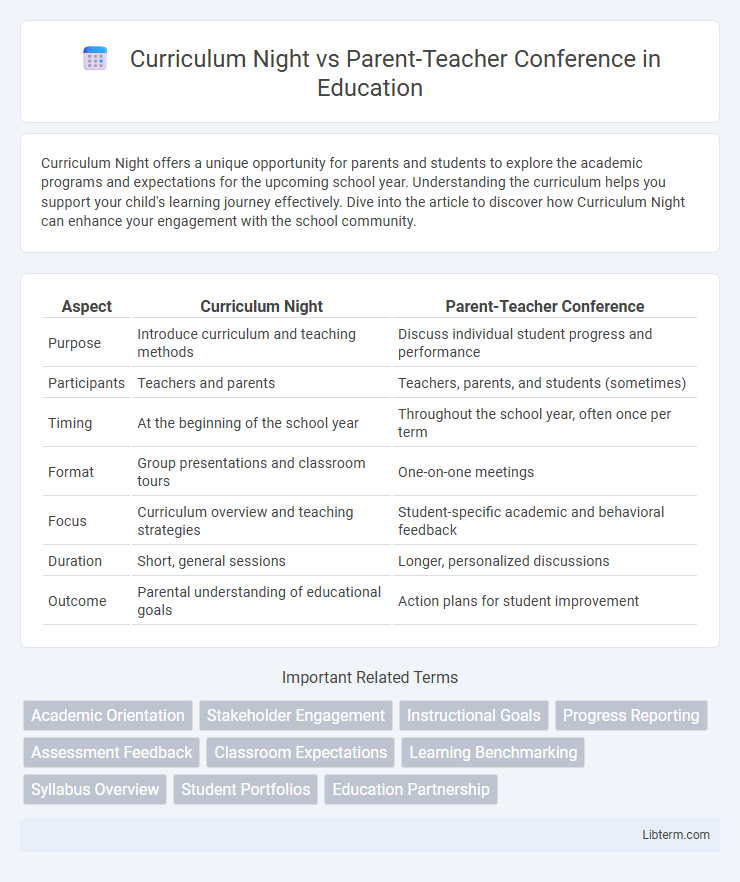Curriculum Night offers a unique opportunity for parents and students to explore the academic programs and expectations for the upcoming school year. Understanding the curriculum helps you support your child's learning journey effectively. Dive into the article to discover how Curriculum Night can enhance your engagement with the school community.
Table of Comparison
| Aspect | Curriculum Night | Parent-Teacher Conference |
|---|---|---|
| Purpose | Introduce curriculum and teaching methods | Discuss individual student progress and performance |
| Participants | Teachers and parents | Teachers, parents, and students (sometimes) |
| Timing | At the beginning of the school year | Throughout the school year, often once per term |
| Format | Group presentations and classroom tours | One-on-one meetings |
| Focus | Curriculum overview and teaching strategies | Student-specific academic and behavioral feedback |
| Duration | Short, general sessions | Longer, personalized discussions |
| Outcome | Parental understanding of educational goals | Action plans for student improvement |
Understanding Curriculum Night: Purpose and Format
Curriculum Night serves as an informational event where teachers present the course objectives, teaching methods, and academic expectations to parents, fostering a clear understanding of the educational program. Its format typically includes presentations, classroom tours, and Q&A sessions, allowing parents to gain insights into the curriculum structure and classroom environment. This event emphasizes proactive engagement, helping parents support their child's learning journey from the outset of the school year.
What Happens at a Parent-Teacher Conference
Parent-Teacher Conferences facilitate direct communication between educators and parents to discuss a student's academic progress, behavioral development, and social skills in detail. During these meetings, teachers provide personalized feedback, review assessment results, and outline strategies to support the student's learning at home. Unlike Curriculum Night, which offers an overview of the course structure and classroom expectations, Parent-Teacher Conferences prioritize individualized evaluation and collaborative goal-setting for the student's success.
Key Differences Between Curriculum Night and Parent-Teacher Conferences
Curriculum Night primarily offers a broad overview of the academic goals, teaching methods, and classroom expectations to parents, enabling them to understand the school year's roadmap. Parent-Teacher Conferences provide personalized feedback on a student's academic progress, strengths, and areas needing improvement through one-on-one discussions. While Curriculum Night focuses on general curriculum information, Parent-Teacher Conferences emphasize individual student performance and tailored support strategies.
Goals of Curriculum Night for Parents and Teachers
Curriculum Night aims to provide parents with a clear overview of the academic expectations, teaching methods, and classroom routines, fostering transparency and alignment between home and school. Teachers use this event to communicate learning objectives, curriculum standards, and assessment strategies, creating a collaborative environment that supports student success. The primary goal centers on building a partnership that empowers parents to reinforce learning goals and monitor student progress effectively throughout the academic year.
Individualized Communication in Parent-Teacher Conferences
Parent-Teacher Conferences provide individualized communication tailored to each student's progress, strengths, and challenges, allowing teachers and parents to discuss specific learning goals and interventions. Unlike Curriculum Night, which offers a general overview of the year's curriculum and classroom expectations for all students, Parent-Teacher Conferences facilitate personalized feedback that addresses unique academic and behavioral needs. This targeted interaction helps develop customized strategies to support each child's educational growth effectively.
Timing and Frequency: When Each Event Occurs
Curriculum Night typically occurs early in the school year, often within the first few weeks, allowing parents to review the syllabus, classroom expectations, and teacher goals. Parent-Teacher Conferences are scheduled periodically throughout the academic year, commonly once per semester or quarter, providing opportunities to discuss the student's academic progress and behavioral development. These distinct timings serve different purposes: Curriculum Night focuses on orientation and planning, while Parent-Teacher Conferences emphasize individualized student evaluation and support.
Information Shared: Group vs. Student-Specific
Curriculum Night provides parents with general information about the class structure, curriculum objectives, and teaching methods, addressing the entire group of students collectively. Parent-Teacher Conferences focus on individual student performance, behavior, and progress, offering personalized feedback tailored to each child's specific needs. This distinction allows Curriculum Night to set expectations school-wide, while conferences enable targeted discussions to support student development.
Parent Engagement: Participation and Interaction
Curriculum Night fosters broad parent engagement by offering families an overview of academic expectations and classroom routines, encouraging participation through interactive presentations and Q&A sessions. Parent-Teacher Conferences provide targeted, personalized interaction focused on individual student progress, enabling in-depth discussions that support tailored learning plans. Both events enhance parent involvement, but Curriculum Night emphasizes collective understanding while conferences promote direct collaboration between parents and teachers.
Preparing for Curriculum Night vs. Parent-Teacher Conference
Preparing for Curriculum Night involves reviewing the school's curriculum outline, understanding course objectives, and formulating questions about instructional methods and assessment strategies to ensure alignment with educational goals. In contrast, preparing for a Parent-Teacher Conference requires gathering specific information about the child's academic performance, behavior, and social development to discuss personalized strategies for improvement and support. Both events benefit from organized notes, clear communication goals, and active participation to maximize engagement and collaboration between parents and educators.
Maximizing the Benefits of Both School Events
Curriculum Night offers parents a comprehensive overview of the academic expectations and teaching methods, fostering a clear understanding of the curriculum framework. Parent-Teacher Conferences provide personalized feedback on student progress, enabling targeted discussions about individual strengths and areas for improvement. Combining insights from both events maximizes parental engagement and supports tailored educational strategies that enhance student success.
Curriculum Night Infographic

 libterm.com
libterm.com